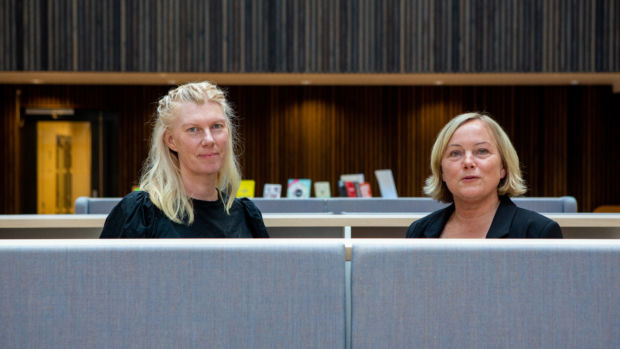A WARNING FROM NORWAY

Document - Av: Redaksjonen 22. juni 2022, 21:00
Big Brother may have been created in the dungeons of Hollywood and Davos, but innocent-looking Norway is now at the forefront of implementing the most dystopian principles of the NWO.
Watch this broadcast, in which you will find a video from Hugo Talks. He’s also pointing at Norway, but for entirely different reasons.
Statistics Norway demands to know exactly what Norwegians buy in the grocery store
Written by Martin Gundersen on May 28, 2022

- How detailed maps of our lives does the state apparatus really need to make good decisions? asks NTNU researcher.
Statistics Norway (SSB) knows where you live, what you earn, and what you have on your record. If Statistics Norway gets its way, they will also soon find out exactly what Norwegians buy in the grocery store and otherwise spend money on.
Statistics Norway has in fact ordered the grocery chains NorgesGruppen, Coop, Bunnpris, and Rema 1000 to share all their receipt data with the statistical agency. Nets, the company that processes eight out of ten in-store payments, has also been required to share detailed information on all transactions.
- A link between a payment transaction made with a debit card and a grocery receipt enables Statistics Norway to link a payment transaction and receipt for more than 70 percent of grocery purchases, the statistics agency writes in a cost-benefit assessment.
The collection of the data will signal the start of a new era for the statistics agency - to harvest data from commercial actors as they have done with public registers.
Several NRKs have spoken to in the financial industry and retail experience find that Statistics Norway's desire for increased data collection raises a number of difficult questions. To NRK, NorgesGruppen states that they will appeal the decision to hand over receipt data and that they will ask the Norwegian Data Protection Authority for guidance.
Discussed since 2013
In 2012, 3,000 households wrote detailed lists of what they had bought in a paper booklet for a comprehensive survey of Norwegian consumption. The information was used, among other things, to inform tax policy and calculate the size of social assistance and child allowance.
- You should write down everything the household had bought. You should preferably know what each chop costs, says Kristin Egge-Hoveid who is the project manager for Consumption Statistics.

The survey was time-consuming and had many sources of error, says Egge-Hoveid. In 2013, therefore, they began to discuss the possibility of obtaining the electronic tracks that consumers left behind anyway.
This year, Statistics Norway will again conduct a consumption survey, but the paper booklet has been replaced with an app that scans receipts. In addition, the new data will be used to improve the quality of the statistics.
- We saw that there was an opportunity to get a much richer database and remedy these major quality challenges we have had with under-reporting and other biases. That was the start, but this database can also be a source of other statistics Statistics Norway compiles, says Egge-Hoveid.
Statistics Norway believes that they need access to all the data in order to be able to create detailed statistics at the household level. And even though the data are at the individual level, Statistics Norway emphasizes that they are only concerned with groups of people.
- When the purchases are linked to person/household, it will be possible in the consumption statistics and diet statistics to analyze socio-economic and regional differences in consumption, and link it to variables such as income, education, and place of residence, it says in Statistics Norway's cost-benefit assessment.
▼More about Statistics Norway and data collection
- Statistics Norway has traditionally collected personal information from public registers and surveys.
- Statistics Norway may order public and private actors to share information pursuant to section 10 of the Statistics Act.
- Statistics Norway already receives transaction data, but these are at the company level and not personally identifiable.
- Statistics Norway has received test data for transactions and receipts, but the decision this spring allows Statistics Norway to use the information for statistical production.
- Statistics Norway never releases information about individuals to other actors.
Some examples of where Statistics Norway retrieves information from public registers:
- Residence and kinship information from the National Population Register
- Tax, income, account owner, and tax information from the Tax Administration
- Social security information from NAV
- Educational information from the school system and the Loan Fund
- Crime information from the police and the Prison and Probation Service
Source: Statistics Norway
The data should not be deleted
- That the entire population's payment transactions should be collected so that some households do not have to fill out surveys is not proportionate, says Ph.D. student Mona Naomi Lintvedt at UiO's center for forensic informatics.

Lintvedt believes that Statistics Norway should consider collecting smaller amounts of data. She also wonders how long the information will be stored.
- What happens to the raw data then? Are they kept so that Statistics Norway has a rich archive that shows our daily shopping habits from the time they start collecting until sometime in the future, ie indefinitely?
- I understand the objection, but our conclusion after careful assessments is that it is not disproportionate to the framework we have as a statistical agency, says Ann-Kristin Brændvang who is Statistics Norway's director of personal and social statistics.
- There are no other ways to do it and the overall use in Statistics Norway indicates that the benefit to society is greater than the disadvantage, Brændvang says.
Brændvang envisages that the receipt and transaction data can become a common data source for many statistics. Statistics Norway is now in a test period of two years where they will assess what is appropriate to collect and what the information can be used for.
Statistics Norway states that it is a matter of obtaining 2.4 million receipts daily and 1.6 billion transactions annually. The data will "in principle" not be deleted, NRK is informed.
- In general, we are concerned that the statistics should be verifiable with the information we receive in original form with time and everything. It is an important part of the statistics documentation, says IT director Christian Thindberg at Statistics Norway.
More and more data is being collected
- How detailed maps of our lives does the state apparatus really need to make good decisions? asks research fellow Lisa Reutter at NTNU.
Reutter is researching how the public sector is being digitized and is using more and more data.
- When we increase the public administration's ability to classify, predict and control citizens' behavior using large amounts of digital data, the balance of power between citizen and state is shifted, Reutter says.
She believes that the shift in power is not necessarily a problem, but that "it happens without us as citizens really being aware of it".

Statistics Norway has a long history that drives us to better understand what Norwegians do and how we feel. After World War II, Statistics Sweden was central in establishing the National Population Register, which led to everyone being given a unique social security number.
In the 1960s, Statistics Norway began collecting data from public registers. Now a number of public actors - NAV, the Tax Administration, the Prison and Probation Service, and the school system - share detailed information about us.
- It is not so new for Statistics Norway to have the opportunity to make fine-mesh analyzes. It may be different from other public agencies that now get more and more data from which they can make statistics, says Brændvang.
- It is a slightly different data source, but we have had the opportunity to publish on very small groups and sensitive groups for a very long time. However, we do not do this because we have requirements for confidentiality and privacy from the Statistics Act. Statistics are not about individuals, but about describing the main features and development in society, says Brændvang.
Grocery chain: I will complain
- We will appeal the decision and in parallel ask for guidance from the Norwegian Data Protection Authority, says Executive Vice President Truls Fjeldstad in NorgesGruppen.
Fjeldstad describes the decision as "so intrusive towards our customers' personal information that we can not follow this without consulting the Data Inspectorate".
- Coop is positive that Statistics Norway has a basis for making good statistics and is aware that we are required by the Statistics Act to hand over personal information to Statistics Norway, writes communications manager Harald Kristiansen in Coop.
Kristiansen states that Coop is considering appealing the decision.
Finans Norge, a member organization for Norwegian financial institutions, is concerned with having a good process with Statistics Norway.
- For Norwegian banks, it is important, especially since the model is new, that this information is disclosed to Statistics Norway in a secure manner and in a way that enables Norwegian banks to be sufficiently confident that Statistics Norway has sufficient authority to obtain this information and has made the necessary assessments, writes Nils Henrik Heen in Finans Norge.
Nets support the statement to Finans Norge, and states that they have previously expressed to Statistics Norway "concern about the collection and compilation of data that may be problematic and intrusive for the individual citizen".
The Data Inspectorate tells NRK that they have received an inquiry to look into the case and that it is currently too early to say anything more about further proceedings.
Must be stored securely
In recent years, a number of private and public actors have been exposed to extensive data breaches: Health South-East, the Storting, Hydro, and Amedia.
- How do you assess the risk of a data breach that causes data to go astray or that there are other forms of misuse?
- It is a great social responsibility and we spend more and more resources on IT security, says IT director Christian Thindberg.
He does not want to describe his security regime in detail but says that there are a number of routines and measures that ensure that the information is in safe hands.
One of the most important is that few employees have access to personally identifiable raw data, and no one has access to everything. The employees have a duty of confidentiality and everything they do in the system is logged to detect attempts at abuse.

For the transaction data, for example, you will change the account number, which can identify a person, to another unique number. The process, called pseudonymization, makes it more difficult to determine who made a particular purchase.
Statistics Norway also has computer systems that mean that few employees have to see the raw data to create statistics.
- There are algorithms that ensure that the data is not at the individual level as early as possible in the statistics production process, says Thindberg.

Martin Gundersen - Hey! I write about a lot of weird things, but it's mostly about the topics of privacy, IT security, and social media. I would like to talk to you if you have experienced a data breach or had your privacy violated. Contact me by email , @martingund or (+47) 47 75 65 15 (Signal).
Commentary:
HUMAN SYNTHESIS
COPYRIGHTS
Copy & Paste the link above for Yandex translation to Norwegian.
WHO and WHAT is behind it all? : >
The bottom line is for the people to regain their original, moral principles, which have intentionally been watered out over the past generations by our press, TV, and other media owned by the Illuminati/Bilderberger Group, corrupting our morals by making misbehavior acceptable to our society. Only in this way shall we conquer this oncoming wave of evil.
All articles contained in Human-Synthesis are freely available and collected from the Internet. The interpretation of the contents is left to the readers and does not necessarily represent the views of the Administrator. Disclaimer: The contents of this article are of the sole responsibility of the author(s). Human-Synthesis will not be responsible for any inaccurate or incorrect statement in this article. Human-Synthesis grants permission to cross-post original Human-Synthesis articles on community internet sites as long as the text & title are not modified.
HUMAN SYNTHESIS